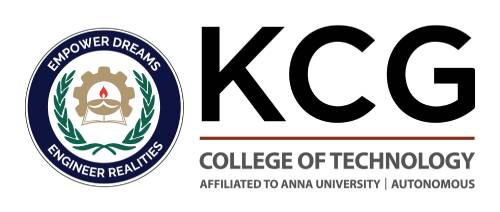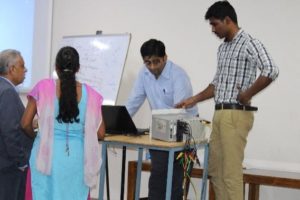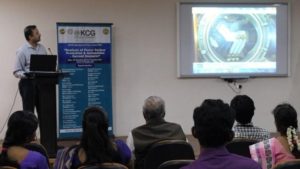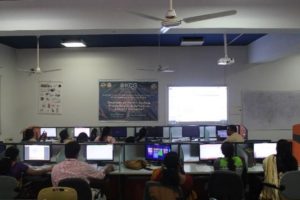The Department of Electrical and Electronics Engineering, KCG College of Technology organized Two Week Faculty Development Programme on Analysis of Power System Protection And Automation- Current Scenario from 26th November – 9th December, 2017.
The inaugural function commenced at 9.00 am in Seminar Hall-I. The meeting began with an invocation and welcome address by Dr. P. DeivaSundari, Professor & Head, Department of EEE. The The meeting was presided by Dr. G. Prabhakaran, Principal. He congratulated the Department of EEE for hosting such FDPs in association with industries and offered his felicitations. Dr. G. Sambandan, Advisor – Electrical Sciences also addressed the gathering stating the significance of the topic in current scenario. Around 65 participants registered for the programme.The participants mostly were Faculty and Research Scholars from major academic institutions in and around Tamilnadu.
The programme was inaugurated by the Chief Guest, Mr A. Panchalingam, Chief Engineer, Protection and Communication, Tamilnadu Transmission Corporation Limited (TANTRANSCO), Chennai. He shared his views regarding basic protection schemes and recent advancements in protection. He also enlightenened the gathering with the concept of digital substation. The guest of honour, Mr. Balaji Seshadri, Lead Commissioning Specialist, General Electric, Chennai shared his views on power sector growth.
Day 1
Date: 26.11.2017
Session I & II: Power Protection Test Equipment Demo
Venue: Seminar Hall (F14)
The fundamentals of Power System Protection, and transformer differential protection was discussed in detail. Differential protection of transformer using P642 numerical relay and OMICRON was demonstrated to the participants.
Day 2
Date: 27.11.2017
Session I: Fundamentals of Power System Protection
Speaker: Dr.Mahendra V Chilukuri, Associate Professor, School of Electrical Engineering, VIT University, Vellore
Venue: Seminar Hall (F14)
Dr.Chilukuri discussed the various protection characterstics and protection zones in power system. He explained the various types of protection relays. He showed the practical aspects of protection with a comparative study in Malaysian power system.
Session II: Main and Back-up Protection
Speaker: Dr.Mahendra V Chilukuri, Associate Professor, School of Electrical Engineering, VIT University,Vellore
Venue: Seminar Hall (F14)
The session started with the basics of current transformer and potential transformer highlighting the various protection related terms like CT error, CT saturation. The session continued with optical instrument transducer.
Session III: Grid Transformers Protection
Speaker: Dr.Mahendra V Chilukuri, Associate Professor, School of Electrical Engineering, VIT University, Vellore
Venue: Seminar Hall (F14)
The speaker had discussion on various relay characteristics and working of various types of relays. He explained in detail the working of static relays, numerical relays and features of relays used in protection of grid transformers.
Day 3
Date: 28.11.2017
Session I: Transformer, Generator and Motor Protection
Speaker: Dr.Mahendra V Chilukuri, Associate Professor, School of Electrical Engineering, VIT University, Vellore
Venue: Seminar Hall (F14)
The session started with principles of unit protection. He explained in detail the biased differential current relay for the protection of generators and motors. He emphasised on transformer inrush phenomenon. The conditional monitoring of transformers which is one of the recent key research areas in power systems was also discussed.
Session II: Condition Monitoring and Asset Management – Partial Discharge Diagnosis Technique for Offline & Online Analysis
Speaker: Dr.S.Venkatesh Associate Professor, School of Electrical Engineering, VIT University, Vellore
Venue: Seminar Hall (F14)
Dr.S.Venkatesh discussed the importance of condition monitoring and asset management, the need for power engineers in this area for further research. The session also dealt with the need of testing of power apparatus. The discussion continued with basic principles of Partial Discharge (PD) and various voltage and current PD waveforms. The principle of Partial Discharge Detection Circuits and PD Analyser was also discussed.
Session III: Electric Arc Flash Analysis.
Speaker:Dr.Mahendra V Chilukuri, Associate Professor, School of Electrical Engineering, VIT University, Vellore
Venue: Seminar Hall (F14)
The session stared with basics of arc-flash phenomenon, its characteristics and the effects of arc-flash that lead to switchgear damage. The speaker also dealt with arc -lash measurement techniques and calculations. A case study on arc-flash helped the participants to have a practical exposure on arc-flash techniques.
Session IV: Non-intrusive Testing Techniques for Ageing/ Residual Life Assessment of Power Equipment Conventional & Non Conventional Approaches
Speaker: Dr.S.Venkatesh, Associate Professor, School of Electrical Engineering, VIT University
Venue: Seminar Hall (F14)
He enlightened the audience with the Electric Treeing and the Testing of PD Test Setup. He showed photographs of laboratory studies conducted at LIT- University of Bologna. Variety of analysis techniques applied on the data to extract characteristic information of PD was also discussed. The session continued with the discussion on classifiers for multiple source PD pattern recognition and types of on-line PD measurement system challenges related to online PD analysis.
Day 4
Date: 29.11.2017
Session I: Network Planning Using Advanced Power System Simulation Tool (Siemens Software)
Speaker: Mr. Vikas Chaturvedi, Maintenance and Support, Siemens, Gurgaon.
Venue: Seminar Hall (F14)
The session dealt with PSSE, the transmission planning software from Siemens. The challenges in expansion, operation, regulatory compliance, system reliability and security were discussed. Hosting capacity calculation, distribution network analysis by PSSSINCAL was discussed. The features along with the add on modules of the software was dealt in detail.
Session II: HVDC
Speaker: Dr. Mahendra V. Chilukuri, Associate Professor, School of Electrical Engineering, VIT University, Vellore
Venue: Seminar Hall (F14)
He discussed in detail the aspects of HVDC Technology. A comparative study of AC & DC Transmission and detailed discussion on worldwide HVDC links along with a schematic presentation of HVDC transmission system was done. This was followed by an informative session on HVDC applications in India. A schematic diagram of Converter Station was presented in the session.
Day 5
Date: 30.11.2017- Field Trip to Indira Gandhi Centre for Atomic Research (IGCAR), Kalpakkam.
A visit to Simulating and Training Centre, Fast Breeder Test Reactor at IGCAR was made. At simulating centre, the entire process was simulated using C and Fortran and the mock control panel has been created for training the operators. This centre simulates the control panel of 500 MW Prototype Fast Breeder Reactor.
The Fast Breeder Test Reactor (FBTR) is a breeder reactor of 40 MW capacity. The Indira Gandhi Center for Atomic Research (IGCAR) and Bhabha Atomic Research Centre (BARC) jointly designed, constructed and operate the reactor. The reactor was designed to produce 40 MW of thermal power and 13.2 MW of electrical power. It is called Stage-II reactor because its fuel plutonium carbide is extracted from irradiated fuel from MAPS (Madras Atomic Power Station) reactors, which in turn called Stage-I reactors, whose main fuel is Uranium 235 and Uranium 238.
Day 6
Date: 01.12.2017
Session I: Grid Integration of Renewable energy and related Issues
Speaker: Dr. Sasi K Kottayil, Professor, Electrical and Electronics Engineering, Amrita VishwaVidhyapeetham University, Coimbatore.
Venue: Seminar Hall (F14)
The session started with discussion on net metering system with small grid-tied PV without storage and PV with dual mode inverter and storage. The various aspects of medium and large sized grid connected PV system and RE based smart micro grid was dealt in the session. The various wind turbine driven electrical machines like wind turbine driven squirrel cage induction generators, permanent magnet synchronous generators and variable speed induction generators was emphasized in the session. A new concept of smart solution for energy storage and demand dispatch was also given.
Session II : Issues & Control of Grid integrated Renewable Energy Systems
Speaker: Mr. Prasun Kumar Das Assistant Director, NIWE, Chennai
Venue: Seminar Hall (F14)
He emphasized on concepts of Solar Radiation Resource Assessment (SRRA) and gave a schematic representation of typical SRRA station. The basic principle of solar cell principle, losses in solar cell and different types of solar modules and its characteristics were discussed in the session. Latest topics of research such as losses in grid connected system and grid integration issues also were discussed.
Session III : UHV Transmission
Speaker: Dr.R.Sarathi, Professor, Department of Electrical Engineering, IITM, Chennai
Venue: Seminar Hall (F14)
The session started with need for UHV transmission system and the various challenges in UHV AC system. He dealt in detail the various Temporary Over Voltages (TOV), Slow Front or Switching Over Voltages (SFOV), Fast Front Over Voltages (Lightning Over Voltages) and Very Fast Transient Over Voltages (VFTO). The general principle of insulation coordination and various methods of determination of the system voltage stress were discussed under insulation coordination.
Day 7
Date: 02.12.2017
Session I: Overview of Blackouts – Lessons to be Learnt
Speaker: Dr. G. Sambandan, Advisor-Electrical Sciences, KCG College of Technology
Venue: Seminar Hall (F14)
The session dealt with the overview of blackouts, major global blackouts, blackouts in India, the twelve biggest blackouts in history, the reasons for blackouts and the lessons to be learnt. The session was stimulating with questions from participants and the real time examples that Dr.G.Sambandan shared from his experience.












